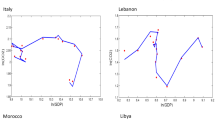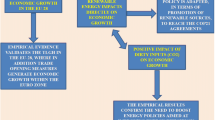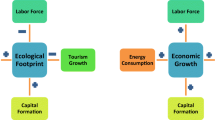Abstract
This study aims to analyze the relationship among international tourism, energy consumption, carbon dioxide emissions, and economic growth in Mediterranean countries for the 1995–2014 data period. According to the results of panel quantile regression model for 17 countries, the tourism-led growth hypothesis is valid in low growth levels, but deviations from this hypothesis are determined after the middle growth level. Also, the CO2 coefficient at low growth levels indicated that sustainable growth is achieved, but no significant results are obtained at subsequent growth levels. Finally, energy consumption supports economic growth at low and medium growth levels. Short-run causality test results illustrated that there is bidirectional causality between GDP and all explanatory variables.
Similar content being viewed by others

Notes
Albania, Bosnia and Herzegovina, Algeria, Morocco, France, Croatia, Spain, Israel, Italy, Montenegro, Cyprus, Egypt, Arab Rep., Lebanon, Malta, Slovenia, Turkey, and Greece.
References
Akadiri SS, Alola AA, Akadiri AC (2019) The role of globalization, real income, tourism in environmental sustainability target. Evidence from Turkey. Sci Total Environ 687:423–432
Antonakakis N, Dragouni M, Filis G (2015) How strong is the linkage between tourism and economic growth in Europe? Econ Model 44:142–155
Apergis N, Payne JE (2009a) Energy consumption and economic growth in Central America: evidence from a panel cointegration and error correction model. Energy Econ 31:211–216
Apergis N, Payne JE (2009b) Energy consumption and economic growth: evidence fromthe commonwealth of independent states. Energy Econ 31:641–647
Apergis N, Payne JE (2012) Tourism and growth in the Caribbean – evidence from a panel error correction model. Tour Econ 18(2):449–456
Aratuo DN, Etienne XL (2019) Industry level analysis of tourism-economic growth in the United States. Tour Manag 70:333–340
Aslan A (2013) Energy consumption and GDP: the strong relationship in OECD countries. Energy Sources, Part B: Economics, Planning, and Policy 8(4):339–345
Aslan A, Dogan E (2017) Exploring the relationship among CO2 emissions, real GDP, energy consumption and tourism in the EU and candidate countries: evidence from panel models robust to heterogeneity and cross-sectional dependence. Renew Sust Energ Rev 77:239–245
Azam M, Alam MM, Hafeez MH (2018) Effect of tourism on environmental pollution: further evidence from Malaysia, Singapore and Thailand. J Clean Prod 190:330–338
Bianco, V. (2019). Analysis of electricity consumption in the tourism sector. A decomposition approach. Journal of Cleaner Production xxx- xxx
Bilen M, Yilanci V, Eryüzlü H (2017) Tourism development and economic growth: a panel granger causality analysis in the frequency domain. Curr Issue Tour 20(1):27–32
Canh LQ (2011) Electricity consumption and economic growth in Vietnam: a cointegration and causality analysis. J Econ Dev 13:24–36
Chandran VGR, Sharma S, Madhavan K (2010) Electricity consumption-growth nexus: the case of Malaysia. Energy Policy 38:606–612
Chen CF, Chiuo-Wei S (2009) Tourism expansion, tourism uncertainty and economic growth: new evidence from Taiwan and Korea. Tour Manag 30:812–818
Chulaphan W, Barahona JF (2018) Contribution of disaggregated tourism on Thailand's economic growth. Kasetsart Journal of Social Sciences 39:401–406
Cortes-Jimenez I, Pulina M (2010) Inbound tourism and long run economic growth. Curr Issue Tour 13(1):61–74
Cró S, Martins AM (2020) Foreign direct investment in the tourism sector: the case of France. Tour Manag Perspect 33:100614
De Long JB, Summers LH (1991) Equipment investment and economic growth. Q J Econ 106:445–502
Dritsakis N (2012) Tourism development and economic growth in seven Mediterranean countries: a panel data approach. Tour Econ 18(4):801–816
Dumitrescu EI, Hurlin C (2012) Testing for granger non-causality in heterogeneous panels. Econ Model 29(4):1450–1460
Fahimi A, Akadiri SS, Seraj M, Akadiri AC (2018) Testing the role of tourism and human capital development in economic growth. A panel causality study of micro states. Tour Manag Perspect 28:62–70
Gössling S (2000) Sustainable tourism development in developing countries: some aspects of energy use. J Sustain Tour 8(5):410–425
Habibi F, Rahmati M, Karimi A (2018) Contribution of tourism to economic growth in Iran's provinces: GDM approach. Future Business Journal 4:261–271
Jalil A, Mahmood T, Idrees M (2013) Tourism-growth nexus in Pakistan: evidence from ARDL bounds tests. Econ Model 35:185–191
Katircioglu ST (2014) International tourism, energy consumption, and environmental pollution: the case of Turkey. Renew Sust Energ Rev 36:180–187
Katircioglu ST, Feridun M, Kilinc C (2014) Estimating tourism-induced energy consumption and CO2 emissions: the case of Cyprus. Renewable and Sustainable EnergyReviews 29(634):40
Khan MTI, Yaseen MR, Ali Q (2019) Nexus between financial development, tourism, renewable energy, and greenhouse gas emission in high-income countries: a continent-wise analysis. Energy Econ 83:293–310
Kocak E, Ulucak R, Ulucak ZS (2020) The impact of tourism developments on CO2 emissions: an advanced panel data estimation. Tour Manag Perspect 33:100611
Koenker R (2004) Quantile regression for longitudinal data. J Multivar Anal 91:74–89
Koenker R, Bassette G (1978) Regression quantiles. Econometrica 46:33–50
Lai TM, To, W. M, Lo WC, Choy YS, Lam KH (2011) The causal relationship between electricity consumption and economic growth in a gaming and tourism center: the case of Macao SAR, the People’s republic of China. Energy 36:1134–1142
Lanza A, Pigliaru F (2000) Tourism and economic growth: does country's size matter? Rivista Internazionale di Scienze Economiche e Commerciali 47:77–85
Lee JW, Brahmasrene T (2013) Investigating the influence of tourism on economic growth and carbon emissions: evidence from panel analysis of the European Union. Tour Manag 38:69–76
Lee CC, Chang CP (2005) Structural breaks, energy consumption, and economic growth revisited: evidence from Taiwan. Energy Econ 27:857–872
Lee JW, Kwag M (2013) Green growth and sustainability: the role of tourism, travel and hospitality service industry in Korea. Journal of Distribution Science 11(7):15–22
Liu A, Wu DC (2019) Tourism productivity and economic growth. Ann Tour Res 76:253–265
Liu A, Song H, Blake A (2018) Modelling productivity shocks and economic growth using the Bayesian dynamic stochastic general equilibrium approach. Int J Contemp Hosp Manag 30:3229–3249
Mardani A, Streimikiene D, Cavallaro F, Loganathan N, Khoshnoudi M (2019) Carbon dioxide (CO2) emissions and economic growth: a systematic review of two decades of research from 1995 to 2017. Sci Total Environ 649:31–49
Moutinho V, Costa C, Cerdeira Bento JP (2015) The impact of energy efficiency and economic productivity on CO2 emission intensity in Portuguese tourism industries. Tour Manag Perspect 16:217–227
Munday M, Turner K, Jones C (2013) Accounting for the carbon associated with regional tourism consumption. Tour Manag 36:35–44
Nepal SK (2008) Tourism-induced rural energy consumption in the Annapurna region of Nepal. Tour Manag 29:89–100
Nepal R, Irsyad MI, Nepal SK (2019) Tourist arrivals, energy consumption and pollutant emissions in a developing economy–implications for sustainable tourism. Tour Manag 72:145–154
Odhiambo NM (2009) Energy consumption and economic growth nexus in Tanzania: an ARDL bounds testing approach. Energy Policy 37:617–622
Pablo-Romero MP, Molina JA (2013) Tourism and economic growth: a review of empirical literatüre. Tour Manag Perspect 8:28–41
Pablo-Romero MP, Pozo-Barajas R, Sanchez-Rivas J (2019) Tourism and temperature effects on the electricity consumption of the hospitality sector. J Clean Prod 240:118168
Perles-Ribes JF, Ramón-Rodríguez AB, Rubia A, Moreno-Izquierdo L (2017) Is the tourism-led growth hypothesis valid after the global economic and financial crisis? The case of Spain 1957–2014. Tour Manag 61:96–109
Pesaran MH (2007) A simple panel unit root test in the presence of cross-section dependence. J Appl Econ 22:265–312
Po WC, Huang BN (2008) Tourism development and economic growth – a nonlinear approach. Phisica A 387:5535–5542
Pulido-Fernandez JI, Cardenas-García PJ, Espinosa-Pulido JA (2019) Does environmental sustainability contribute to tourism growth? An analysis at the country level. J Clean Prod 213:309–319
Qureshi MI, Hassan MA, Hishan SS, Rasli AM, Zaman K (2017) Dynamic linkages between sustainable tourism, energy, health and wealth: evidence from top 80 international tourist destination cities in 37 countries. J Clean Prod 158:143–155
Rico A, Martínez-Blanco J, Montlleó M, Rodríguez G, Tavares N, Arias A, Oliver-Solà J (2019) Carbon footprint of tourism in Barcelona. Tour Manag 70:491–504
Robaina-Alves M, Moutinho V, Costa R (2016) Change in energy-related CO2 (carbon dioxide) emissions in Portuguese tourism: a decomposition analysis from 2000 to 2008. J Clean Prod 111:520–528
Ruiz-Guerra I, Molina-Moreno V, Cortes-García FJ, Nunez-Cacho P (2019) Prediction of the impact on air quality of the cities receiving cruise tourism: the case of the port of Barcelona. Heliyon 5:e01280
Salifou CK, Haq u I (2017) Tourism, globalization and economic growth: a panel cointegration analysis for selected West African States. Curr Issue Tour 20(6):664–667
Shaheen K, Zaman K, Batool R et al (2019) Dynamic linkages between tourism, energy, environment, and economic growth: evidence from top 10 tourism-induced countries. Environ Sci Pollut Res 26:31273
Sokhanvar A (2019) Does foreign direct investment accelerate tourism and economic growth within Europe? Tour Manag Perspect 29:86–96
Solarin SA (2014) Tourist arrivals and macroeconomic determinants of CO2 emissions in Malaysia. Anatolia 25(2):228–241
Tang CF, Abosedra S (2014) The impacts of tourism, energy consumption and political instability on economic growth in the MENA countries. Energy Policy 68:458–464
Tang CF, Tan EC (2015) Does tourism effectively stimulate Malaysia’s economic growth? Tour Manag 46:158–163
Tang S, Selvanathan E, Selvanathan S (2007) The relationship between foreign direct investment and tourism: empirical evidence from China. Tour Econ 13(1):25–39
Tang Z, Shang J, Shi C, Liu Z, Bi K (2014) Decoupling indicators of CO2 emissions from the tourism industry in China: 1990–2012. Ecol Indic 46:390–397
Tang CF, Tiwari AK, Shahbaz M (2016) Dynamic inter-relationships among tourism, economic growth and energy consumption in India. Geosystem Engineering 19(4):158–169
Templet PH (1999) Energy, diversity and development in economic systems: an empirical analysis. Energy Policy 30:223–233
Tugcu CT (2014) Tourism and economic growth nexus revisited: a panel causality analysis for the case of the Mediterranean region. Tour Manag 42:207–212
Tugcu CT, Topcu M (2018) The impact of carbon dioxide (CO2) emissions on tourism: Does the source of emission matter? Theoretical and Applied Economics 25(614):125–136
World Tourism Organization (UNWTO) (2008) Climate change and tourism: responding to global challenges. UNWTO, Madrid
World Tourism Organization (UNWTO) 2019. International Tourism Highlights, 2019 Edition. https://www.e-unwto.org/doi/pdf/10.18111/9789284421152
Yazdi S, Salehi K, Soheilzad M (2017) The relationship between tourism, foreign direct investment and economic growth: evidence from Iran. Curr Issue Tour 20(1):15–26
Yorucu V, Mehmet O (2015) Modeling energy consumption for growth in an open economy: ARDL and causality analysis for Turkey. International Journal of Green Energy 12:1197–1205
Zaman K, Shahbaz M, Loganathan N, Raza SA (2016) Tourism development, energy consumption and environmental Kuznets curve: trivariate analysis in the panel of developed and developing countries. Tour Manag 54:275–283
Zhang L, Gao J (2016) Exploring the effects of international tourism on China’s economic growth, energy consumption and environmental pollution: evidence from a regional panel analysis. Renewable and Sustainable EnergyReviews 53:225–234
Zhang S, Liu X (2019) The roles of international tourism and renewable energy in environment: new evidence from Asian countries. Renew Energy 139:385–394
Zhang J, Zhang Y (2018) Carbon tax, tourism CO2 emissions and economic welfare. Ann Tour Res 69:18–30
Zhang Y, Khan SAR, Kumar A, Golpîra H, Sharif A (2019) Is tourism really affected by logistical operations and environmental degradation? An empirical study from the perspective of Thailand. J Clean Prod 227:158–166
Author information
Authors and Affiliations
Corresponding author
Additional information
Responsible editor: Nicholas Apergis
Publisher’s note
Springer Nature remains neutral with regard to jurisdictional claims in published maps and institutional affiliations.
Rights and permissions
About this article
Cite this article
Aslan, A., Altinoz, B. & Özsolak, B. The nexus between economic growth, tourism development, energy consumption, and CO2 emissions in Mediterranean countries. Environ Sci Pollut Res 28, 3243–3252 (2021). https://doi.org/10.1007/s11356-020-10667-6
Received:
Accepted:
Published:
Issue Date:
DOI: https://doi.org/10.1007/s11356-020-10667-6



